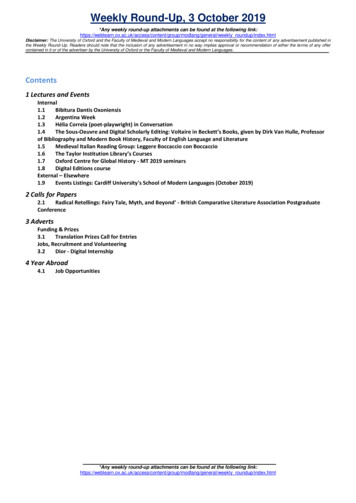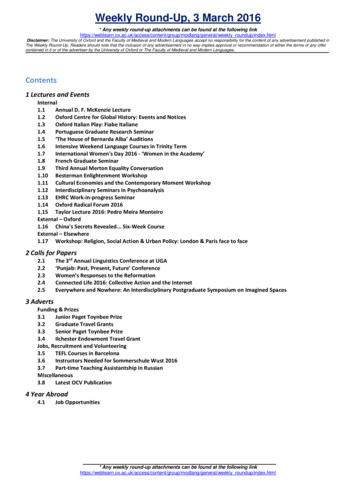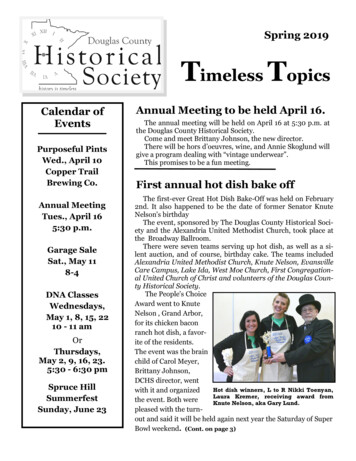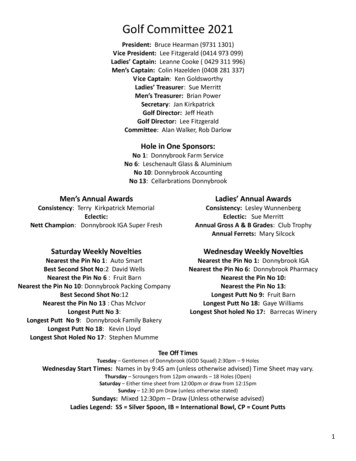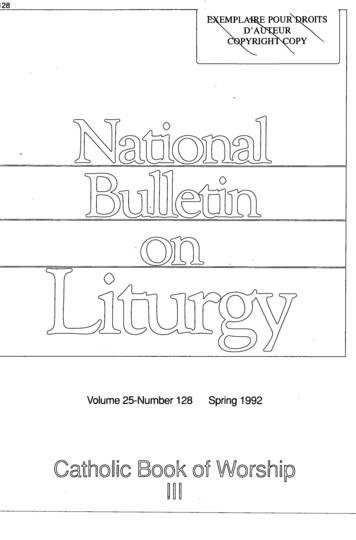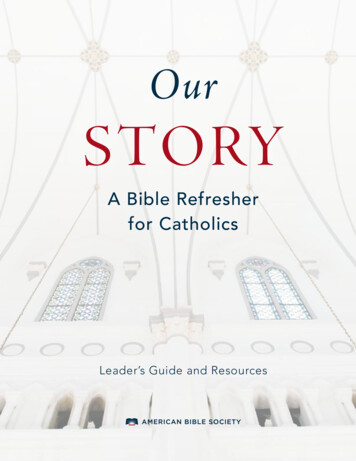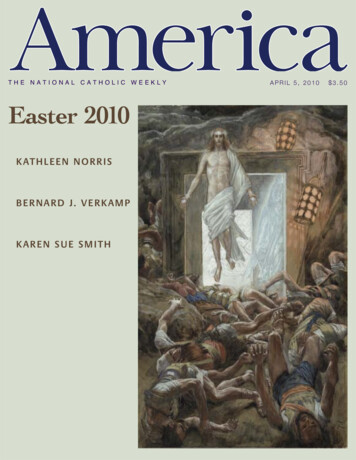
Transcription
THE NATIONAL CATHOLIC WEEKLYEaster 2010K AT H L E E N N O R R I SBERNARD J. VERKAMPKAREN SUE SMITHAPRIL 5, 2010 3.50
OF MANY THINGSPUBLISHED BY JESUITS OF THE UNITED STATESIfailed my first pastoral challenge.The failure still weighs on mebecause the person involved was soclose to me: my grandmother. Nellie—Carmella was her given name—was ashort, stout lady crowned with a headof soft, tight white curls. She was sweetand kind and as well-beloved as she waswidely esteemed for her home cooking.The eldest of 10 surviving children ofan Italian-American family, she hadgone to work at age 9, first in a handkerchief factory and later in a cigar factory; and then at 16 she married mygrandfather.Grandma also possessed a toughnessthat many working-class women had inthe early 20th century. In the daysbefore hospital emergency rooms, forexample, she was the neighborhood surgeon, sewing up the neighbors’ deepercuts and gashes with needle and thread.One warm summer evening years later,Old Man Christian (that’s what shecalled my father’s father) brought homea tough old rooster in a burlap bag. Itturned out no one at his boarding househad been able to slaughter it. He toldthem he knew a woman who would dispatch it; and so Grandma did, twistingoff its head.In social situations, I had never seenGrandma tough or prickly. But at onepoint in my seminary studies, some ofher nephews, all of whom adored her,came to me and asked if I would intercede with her to reconcile with one ofher younger sisters. The origin of theirestrangement was obscure, but the distance and hurt were real. When I askedGrandma whether she would forgivethe slight done her, she hesitated for amoment in a thoughtful, sad silence andthen answered firmly, “No.” I was nonplused. She had never said no to mebefore, and I regret to say that’s wherewe left her nephews’ request.For some people, even consideringforgiving is a nearly impossible task.They pour enormous psychic energyinto resisting the thought. Many voiceswould rule out forgiveness even inchurch life. When Sister CamilleD’Arienzo wrote of her ministry in victim-offender reconciliation two yearsago in these pages (“The Witness ofCourage and Forgiveness,” 2/11/08),irate letters poured in protesting againstencouraging victims to forgive their victimizers. Even Pope John Paul II metfierce opposition from cardinals andCurial officials when he undertook hisministry of apology and forgiveness.We have a popular culture thatthrives on nastiness, backstabbing andvengeance. Think of reality TV. Theharshness of entertainment is notunlike our public life. In criminal andcivil disputes, journalists, attorneys andadvocacy groups work to keep victims’pain alive and in public view. Some victims become convinced they are entitledto stoke their rage forever. To be sure,as we have seen in the crisis that aroseover sexual abuse of minors by members of the clergy, the gay rights movement and the campaigns of the survivors of torture, it takes persistenceand an outsized sense of offense toforce others to see victims’ pain, makeamends and assure that justice is done.But when persistence grows insensitiveand unsupple, it becomes obduracy.When rage overtakes our lives, itdegenerates into blind fury. Wherethere is no place for forgiveness, thehard but lesser virtues necessary forprotest become toxic for society.Those who offend us may not bewilling to apologize. They may fear theconsequences of admitting fault. But ifwe do not forgive, we become locked ina poisonous past, and often others withus. A freely proffered act of forgivenesscan free everyone. Similarly, a willingapology can open a new beginning forall concerned. Thinking back now onmy lack of response to my grandmother’s no, I wish I had asked her: “After along life, what can two Christianwomen do but forgive each other?”DREW CHRISTIANSEN, S.J.EDITOR IN CHIEFDrew Christiansen, S.J.EDITORIAL DEPARTMENTMANAGING EDITORRobert C. Collins, S.J.EDITORIAL DIRECTORKaren Sue SmithONLINE EDITORMaurice Timothy ReidyCULTURE EDITORJames Martin, S.J.LITERARY EDITORPatricia A. KossmannPOETRY EDITORJames S. Torrens, S.J.ASSOCIATE EDITORSGeorge M. Anderson, S.J.Peter Schineller, S.J.Kevin ClarkeART DIRECTORStephanie RatcliffeASSISTANT EDITORSFrancis W. Turnbull, S.J.Kerry WeberASSISTANT LITERARY EDITORRegina NigroBUSINESS DEPARTMENTPUBLISHERJan AttridgeCHIEF FINANCIAL OFFICERLisa PopeADVERTISINGJulia Sosa106 West 56th StreetNew York, NY 10019-3803Ph: 212-581-4640; Fax: 212-399-3596E-mail: e.orgWeb site: www.americamagazine.org.Customer Service: 1-800-627-9533 2010 America Press, Inc.Cover: “The Resurrection,” by JamesTissot. Photo: Brooklyn Museum
www.americamagazine.orgCONTENTSVOL. 202 NO. 11, WHOLE NO. 4889APRIL 5, 2010ARTICLES13 SOMETHING WONDROUS IS AFOOTA reflection on the meaning of EasterKathleen Norris19 JUDGMENT DAYBertrand Russell enters the pearly gates.Bernard J. VerkampCOLUMNS & DEPARTMENTS134Current Comment5Editorial Early in the Morning8Signs of the Times11 Column One Step at a TimeMargaret Silf28 Poem Todo-Nada Robert F. Morneau35 Letters39 The Word Held Fast in PeaceBarbara E. Reid19B O O K S & C U LT U R E25 ART James Tissot’s visionary paintings of Jesus BOOKS JesusWars; A History of Catholic Moral Theology in the TwentiethCentury; ChristianityON THE WEBON THE WEBKaren Sue Smith offers a video reflection on James Tissotʼspaintings, and Maurice Timothy Reidy reviews HBOʼs “ThePacific.” Plus, Richard Gaillardetz speaks on Vatican IIfrom the Los Angeles Religious Education Congress.All at americamagazine.org.25
CURRENT COMMENTAchieving Step OneHurrah! The yearlong battle has been won, and the healthcare reform bill is now the law of the land. Most Americanswill benefit from the legislation: the insured who could getsick or lose their job; those with Medicare/Medicaid coverage whose drug payments fall into “the doughnut hole” gapin coverage; and especially the 32 million Americans currently without insurance. But this historic achievement isonly the first step in what must be a change of attitudeamong the body politic. Americans must abandon thenotion that health care is a luxury for the privileged and a“fringe benefit” from employers but just a wish for theunlucky rest of the population. The truth is that not onlyshould every American have health coverage, but that mostactually can have it—thanks to this bill. Our governmenthas completed a major exercise in “promoting the generalwelfare,” which the Constitution mandates it to do.Part two of the required attitude shift will be more difficult to achieve. Having decided to provide nearly universal coverage, we Americans have to decide how to keepexpensive health costs under control. The bill takes stepstoward containing costs but does not go far enough. Howthe nation exercises fiscal responsibility matters. It oughtnot cut off some citizens’ coverage just to rein in costs, anymore than a family facing hard times would let two orthree members go without food while the rest eat up.Major cost-cutting choices lie ahead. But only a real shiftin attitude, one that seeks to promote the common good,will ensure that the right choices are made.Strategic DivideBefore Vice President Biden’s ill-fated visit to Israel lastmonth, the handwriting was already on the wall. Anyonewatching day-to-day events would not have been surprisedthat U.S. hopes of reopening the Mideast peace talks during Mr. Biden’s visit would have been upended by theannouncement of Israeli plans for the construction of1,600 homes in Arab East Jerusalem. For many monthsthe Israeli police have looked away as Jewish settlersexpelled Arab residents and occupied their homes in EastJerusalem. Elsewhere on the West Bank the military hasseized more land and demolished homes for expansion ofIsrael’s security wall. Once-shared religious shrines havebeen declared Jewish heritage sites; nonviolent protestshave been suppressed; and Israeli human rights activistshave been harassed by police.Had the United States chosen to listen, it did have aprophet interpreting events. In January, General David M.4AmericaApril 5, 2010Petraeus, chief of the U.S. Central Command, whichincludes most of the Middle East and Central Asia, hadwarned the Joint Chiefs of Staff that Israeli policies and itsobduracy in the peace process were harming U.S. strategicinterests. As long as the Israeli-Palestinian conflict goesunresolved, the general counseled, Arab and Muslim governments across the region will distrust U.S. initiativesthere.The rift between the United States and Israel thatoccurred after the Biden snub now goes far deeper thandiplomatic niceties over the timing of an unhelpfulannouncement. It is a seismic clash of strategic visions.American commitment to the Israeli people may be strong,but the alliance between the two nations is pulling apart.Move Over!The multigenerational household, long in decline in theUnited States, is staging a comeback. The number of U.S.families living together that include seniors, working parents and their adult-ish children has hit a 50-year high.During the first year of the current recession, 2007 to2008, the number of Americans living in such multigenerational households rose by 2.6 million to 49 million people—a little over 16 percent of the total U.S. population.The Pew Research Center report suggests that thisincrease continues a trend that began in 1980. Pewattributes the rise of such households to immigrant families moving into the United States and bringing the customwith them, but it reports, on a slightly less positive note,that our foreclosure-spackled economy has also had muchto do with the upturn in multigenerational homesteading.With jobs harder to find and marriages delayed five yearslater than in 1970, children are moving back in with theirparents after college even as their grandparents crowd inwhen their health or incomes require more assistance.Such arrangements mean less loneliness and betterhealth for older Americans. One can only hope that for theyounger generation, they mean a chance to acquire somewisdom from their elders and enjoy economic breathingroom to save a little cash.They are going to need it. An unrelated study reportsthat the percentage of U.S. workers with virtually noretirement savings grew for the third straight year.According to a survey from the Employee Benefit ResearchInstitute, workers who reported that they have less than 10,000 in savings grew to 43 percent in 2010, and confidence in their ability to save enough for a comfortableretirement declined to 16 percent of respondents, the second lowest point in the survey’s 20-year history.
E D I TO R I A LEarly in the MorningChrist is risen!Despite our best efforts as believers, it isoften hard to see the glory for the gloom. Forlarge numbers of unemployed in this country, hope mayseem dim. Likewise, the people of Haiti, who have been suffering through an extended Good Friday, may well feel fatedto disaster. For Catholics in Ireland and Germany, after revelations in recent weeks of sexual abuse of children there,signs of new life may likewise be hard to see.But as the Easter Gospels relate, it took time too forJesus’ disciples to come to see the Easter light. In Luke’sGospel Mary Magdalene, Joanna and Mary the mother ofJames visit the tomb of Jesus “at daybreak.” According toJohn’s Gospel, Mary Magdalene went alone “early in themorning, while it was still dark.” Probably only the palest ofdawns guided their feet, as they made their way to the tomb.The dimness of the light did not deter the women fromrushing to devoutly tend to their Lord.Often it is difficult for us, too, to see what lies aheadin our lives. The past is shrouded in darkness and the wayahead still heavy with shadows. When will a job come? Willit mean starting over in a new field, entail new training andrelocation? After the spreading sexual abuse crisis, can weever feel as confident that the church will be for us the spotless bride of Christ, an unsullied source of grace? Can thefaithful continue to regard bishops as our pastors withouttheir publicly taking responsibility for the failures of supervision that in many cases made the crisis much worse? Infrustration and disillusionment, we strain to see; our visionis impaired.For most of us, even for saints, puzzlement isentwined with faith. In Luke’s Gospel the women peerinto the tomb and are “puzzling over” what they see beforean angel appears to clear things up. Later, when Peter and“the other disciple” reach the tomb, Peter also seems confused. Only the disciple whom Jesus loved “saw andbelieved.” Our days, and often our Easters, are marked bya similar confusion and moments of unbelief. If the Easterproclamation “Christ is risen!” does not leave us completely unmoved, it leaves our hearts still longing to overflow with the joy we do not quite feel. Why can’t we belike the disciple John, loving so much that we believe atthe sight of the empty tomb? Why must we be like Peter,understanding so slowly and then impulsively movingfrom doubt to faith?The disciples repeatedly misapprehend the risen Lord. MaryMagdalene mistakes him for the gardener; and on the road from Jerusalemto Emmaus, the disciples’ “eyes werekept from recognizing him.” In theUpper Room he appears like a ghost, suddenly and inexplicably standing in their midst. Resurrection exceeds ourcapacity to comprehend it. Like the disciples, even whenconfronted with vivid signs of new life, we sometimes fail tounderstand. Applying for jobs, we become frustrated.Confronted with yet another disaster, we find ourselvesovercome with donor fatigue. The repeated narration of thesad facts of sexual abuse wears us down.Yet even in the midst of dimness, confusion and misunderstanding, men and women of faith can glimpse signsof new life. Darkness, shadow and gloom need not comebetween us and the Lord. In his new book, Made forGoodness, Archbishop Desmond Tutu reminds us that“every act of kindness enhances the quality of life.” There isgood news in that the world has averted a depression andunemployment has begun to abate. It should be heartening,too, that after so many catastrophes, Haiti still engages theworld’s commitment. Undeterred by decades of failedexperiments, the leading donor nations are undertakingtogether a long-term reconstruction program for that sorelytested Caribbean nation. Here at home a growing numberof young people, even if they are not yet in church pewsevery Sunday, are doing the work of the church in serviceprograms for the poor.Some sunlight has even begun to pierce the mushroom cloud. The Obama administration has made elimination of nuclear weapons a long-term goal of American policy, and the Holy See’s permanent observer to the UnitedNations has declared that “the conditions that prevailedduring the cold war, which gave a basis for the church’s limited toleration of nuclear weapons, no longer apply.” He reiterated Pope Benedict XVI’s call for “a progressive and concerted nuclear disarmament.”Around us are signs of new life; we have only to seethem to experience the glory of the risen Lord penetratingthe shadows of our lives. If Haiti’s earthquake survivorsemerged from the rubble singing God’s praises, how can wenot chant “Alleluia!” for the signs of new life we encounterwhen we hear the Easter salutation, “Christ is risen!”?April 5, 2010America 5
CATHOLIC SOCIAL TEACHING AND ISSUES OF JUSTICECurriculum Development WorkshopJune 7-11, 2010VILLANOVA UNIVERSITYThe goal of the workshop is to promote the incorporation of Catholic social teaching into existing coursesyllabi and the development of new courses with a significant Catholic social teaching component. Theworkshop is open to all teaching faculty. We welcome scholars without regard to religious belief,particularly junior faculty and younger scholars to whom Catholic social teaching may be unfamiliar.Historical and Social Contexts for Catholic Social Thought:Pre/Post Vatican Council IIBarbara Wall - PhilosophyTheological and Anthropological Foundations for Catholic Social ThoughtKevin Hughes - Theology and Religious StudiesCatholic Social Thought and Economic JusticeRobert DeFina - SociologyTheories of Justice and the Common GoodThomas W. Smith - HumanitiesCatholic Social Thought and EcologyBarbara Wall - PhilosophyService Learning: Scholarship for the Common GoodNoreen Cameron - Office of Service LearningCatholic Social Thought and Human WorkSally Scholz - PhilosophyCatholic Social Thought and the Morality of War and PeaceWilliam Werpehowski - Center for Peace and Justice EducationCatholic Social Thought and RacismLawrence Little - HistoryThe Role of the Church in Public Life and Issues of JusticeMichael Moreland – Villanova School of LawAn Ethic of LifeDarlene Weaver - Theology and Religious StudiesRESIDENT FEE: Housing on campus in air conditioned apartments with meals and materials – 800COMMUTER FEE: No housing, but includes welcome dinner, breakfasts, lunches and materials – 500Registration payments should be made by check payable to Villanova Universityand must be received no later than June 1, 2010.For more information call Marcy Bray at 610-519-5431,Office for Mission & Ministry, 202 Vasey Hall - Villanova University, Villanova, PA 19085or see: http://www.villanova.edu/mission/cstjuneSPONSORED BY THE OFFICE FOR MISSION & MINISTRY6AmericaApril 5, 2010
First-of-its-kind “Footprints of Faith” Tealight CollectionReversibleA Bradford ExchangeExclusive!Sculpted Sandstone-styleArt Candle Collection“Comforting Light”Premiere Edition in the Footprints of FaithTealight Holder CollectionCandle heights vary from 6½ inches to 7½ inches high.www.bradfordexchange.com/footprintsThe “Footprints in the Sand” poem reminds usthat we are always living in the light of God’s love,and that He will be there every step of the way tobrighten our days. Now, this uplifting poem inspiresthe Footprints of Faith Tealight Collection.RESERVATION APPLICATIONSEND NO MONEY NOW9345 Milwaukee Avenue · Niles, IL 60714-1393An exceptional value—with our unconditional guaranteeYES.Each sculpted tealight candleholder is hand-craftedin the decorative sandstone style, a look that Reversible candleholdersbecomes even more enchanting in the warm glow can be turned around toof your FREE tealight candles. These editions are instantly change the lookof your collection!strictly limited, and strong demand is anticipated.Act now to acquire each edition in the Footprintsof Faith Tealight Collection, payable in two monthlyinstallments of 19.97, for a total of 39.95* each,backed by our 365-day money-back guarantee.You may cancel out of the collection at any timesimply by notifying us. Send no money now. Just 2010 The Bradford Exchange01-09287-001-BIUmail the Reservation Application today!The Footprints of Faith Tealight Collection is beingoffered with the cooperation of Margaret Fishback Powers,author of the poem, “Footprints in the Sand.”Permission for Greg K. Olsen’s artwork to appear in thelimited-edition medium has been granted by Mill Pond Press,Venice, Florida, North America’s premier publisher of finequality limited-edition art.Please reserve the Footprints of Faith Tealight CandleholderCollection for me as described in this announcement.Limit: one per order.Please Respond PromptlySignatureMrs. Mr. Ms.Name (Please Print Clearly)AddressCityStateZip902169-E39411*Plus 7.99 shipping and service per item. Limited-edition presentations restricted to 295casting days. Please allow 4-8 weeks after initial payment for shipment of Edition One. Salessubject to product availability and order acceptance.
SIGNS OF THE TIMESIRELANDArchbishop AsksAccountability of ColleaguesArchbishop Diarmuid Martin, left, and CardinalSean Brady address the media near St. Peter'sSquare in Rome on Dec. 11.Archbishop Diarmuid Martin of Dublin called on his episcopal colleagues to take responsibility for the IrishCatholic Church’s failures in dealing with child sexualabuse by priests. “Without accountability for the past there will beno healing and no trust for the future,” Archbishop Martin toldreporters on March 20 following Mass at St. Mary’s Pro-Cathedralin Dublin after Pope Benedict XVI’s pastoral letter to IrishCatholics on the abuse crisis was released.Just a few days later, on March 24, the Vatican announced thatthe pope had accepted the resignation offered on March 9 byBishop John Magee of Cloyne. Magee, 73, had served as personalsecretary to three popes. He was accused in a 2009 investigation ofmishandling reports of sexual abuse in his diocese. Four other Irishbishops had offered their resignations to the pope in Decemberbecause of their mishandling of sexual abuse of children by clerics.The pope has accepted only one of these resignations.Cardinal Sean Brady of Armagh, Northern Ireland, has beenunder pressure to resign since he admitted on March 14 that hehad been aware of allegations of abuseagainst a priest as early as 1975 and failed through abuse; it failed throughdid not report them to police. not preventing abuse; it failed throughCardinal Brady has apologized, but he covering up abuse.” He said: “Childhas resisted calls for his resignation.protection measures need to be conArchbishop Martin described the stantly updated; more participation ofpope’s letter as “part of a strategy of lay men and women is needed to avoidrenewal of the church.” Many people a false culture of clericalism. We need“felt it was much stronger than expect- to develop a fresh idea of what childed,” he said. Asked why the pope did hood means; we need to develop anot make any reference to a Vatican strong horror of what childhood-lostrole in the crisis in Ireland, means.”Archbishop Martin said the responsi“We must face the truth of thebility “very much” fell on the Irish past,” the archbishop said, “repent it;church. “The Vatican had produced make good the damage done. And yetthe norms of canon law and they we must move forward day by dayweren’t respected in the management along the painful path of renewal,of these cases,” he said.knowing that it is only when ourThe pope’s letter was read in full human misery encounters face-to-faceduring Masses on March 20 and 21 in the liberating mercy of God that ourparishes across Ireland. Copies were church will be truly restored andsnapped up quickly by parishioners.enriched.”During his homily on March 20,Reaction from abuse victims to theArchbishop Martin said: “The church papal letter was mixed. John Kelly oftragically failed many of its children: it the Irish Survivors of Child Abuse8AmericaApril 5, 2010said the letter represented a long-overdue apology from the pope. “We arefed up being victims and don’t want toremain victims,” Kelly said. “This letter is a possible step to closure, and weowe it to ourselves to study it and togive it a measured response.”But Maeve Lewis, the executivedirector of the victims group One inFour, said she was deeply disappointedby the letter “for passing up a gloriousopportunity to address the core issuein the clerical sexual abuse scandal: thedeliberate policy of the CatholicChurch at the highest levels to protectsex offenders.”She said, “While we welcome thepope’s direction that the church leadership cooperate with the civil authorities in relation to sexual abuse.we feelthe letter falls far short of addressingthe concerns of the victims.”From CNS and other sources.
HUMAN RIGHTSU.S. UpdatesReporting toInclude ItselfWith much of Washingtonfocused on health carelegislation, the annualrelease of the State Department’scountry reports on human rights practices received little attention this year,though the report helps shape U.S.policy approaches to the world.Vulnerable populations affected bywars and internal conflicts in manyplaces, including Afghanistan, SriLanka, Somalia, Congo and Sudan,were among the major concerns highlighted in the report’s introductionand in remarks by Michael H. Posner,assistant secretary in the Bureau ofDemocracy, Human Rights andLabor, at its release on March 11.Secretary of State Hillary Clinton“We live in a world of conflict,” promised the State Department wouldPosner said, with more than 30 wars for the first time later this year presentand internal conflicts fueled by eth- an internal report on how the Unitednic, racial and religious tensions, States measures up against the humanwhich disproportionately affect rights standard to which it holds otherwomen, children, people with disabil- countries. “Human rights are univerities and refugees.sal, but their experience is local,”He singled out China, Iran, Clinton said at the press conference.Nigeria and Cuba as countries with “This is why we are committed tonotably deteriorating human rights holding everyone to the same stansituations in 2009. Egypt, Russia and dard, including ourselves.”Sri Lanka were cited for what heShe said the United States wouldcalled misuse of national security leg- participate in the U.N. Human Rightsislation to broadly curtail basic civil Council’s universal periodic reviewrights.process. “In the fall, we will present aOther nations with generally good report, based on the input of citizenshuman rights records were flagged for and N.G.O.’s, gathered online and inenacting or considering official gov- face-to-face meetings across the counernment policies that affect vulnerable try attended by senior governmentgroups. Posner included Uganda’s officials,” Clinton said.proposed death penalty for homosexOne issue that the review may touchuals, discrimination against Muslims on is the continued use of the deathin various countries in Europe and penalty in the United States, a concernsanctions against the Roma in Italy, raised by the United Kingdom in itsHungary, Romania, Slovakia and the own annual international human rightsCzech Republic.report on March 17.Posner gave creditto “positive trends” inLiberia, where a truthandreconciliationreport and the prosecution of former President Charles Taylor arehelping heal a countrytorn by a long civil war.HealsonotedGeorgia’s new criminalprocedures, Ukraine’scommission on anticorruption, Bhutan’stransition from absolute monarchy to constitutionally electedgovernment and thefirst multiparty parlia- Secretary of State Hillary Clinton, pictured here at arecent press conference with former British Primementary election in the Minister Tony Blair, promises to hold the UnitedStates to high standards on human rights—its own.Maldives.April 5, 2010America 9
SIGNS OF THE TIMESNuclear StrategyDeters DisarmamentNuclear deterrence, the idea that possessing nuclear weapons discouragesenemy attack, is preventing the goal ofdisarmament from being achieved,said the papal nuncio to the UnitedNations. Archbishop CelestinoMigliore told an audience hosted bythe Woodstock Theological Center atGeorgetown University on March 16that cold war conditions that encouraged the church’s “limited toleration ofnuclear deterrence” no longer exist.Other panelists at the forum said thatreligion can play an important role inachieving the eventual goal of dismantling all nuclear weapons and called fornew international treaties that specifythe depth of weapons cuts, especiallybetween the nuclear superpowers, theUnited States and Russia.Latinos More Secular,Not ProtestantA new analysis of religious identification finds that contrary to popularand scholarly belief, U.S. Latinos arenot leaving the Catholic Church forProtestant churches but are becomingmore secularized, affiliating with nofaith at all. A study released March16 by the Institute for the Study ofSecularism in Society and Culture atTrinity College in Hartford, Conn.,reported that Latinos who have leftthe church since 1990 have shiftedtoward secularism as they becomemore Americanized. The study notedthat as in the general U.S. population,Latinos became less identified withChristianity between 1990 and 2008,down from 91 percent to 82 percent.Those who said they identified withno faith grew to 12 percent in 2008from 6 percent in 1990. TheAmerican Religious IdentificationSurvey of 2008 reports that Latino10AmericaApril 5, 2010N E W S B R I E F SMore than 200,000 people gathered onMarch 21 at the National Mall inWashington, D.C., heard Cardinal RogerMahony of Los Angeles address the Marchfor America supporting comprehensive immigration reform. Byron Lima Estrada, aretired army colonel convicted in the 1998killing of Auxiliary Bishop Juan GerardiConedera of Guatemala City was paroled onMarch 16. Chiara Luce Badano, an Italianmember of Focolare who died of bone cancerjust before her 19th birthday in 1990, will beMarch for Americabeatified on Sept. 25 at a shrine outsideRome. A High Court decision in London on March 17 exempteda Catholic adoption agency from having to accept same-sex andcohabiting couples who present themselves as prospective parents. At the request of the bishops of Bosnia and Herzegovina, theVatican has established an international commission to study allegedMarian apparitions at Medjugorje in Bosnia. Pope Benedict XVIwill preside at the beatification ceremony of Cardinal John HenryNewman in Coventry, England, during a four-day visit to the UnitedKingdom from Sept. 16 to 19.immigrants continue to be the largestfactor in maintaining the size of theU.S. Catholic population. Latinoscomprised 32 percent of all U.S.Catholics in 2008 compared with 20percent in 1990. Among Latinos, 60percent in 2008 said they wereCatholic, compared with 66 percentin 1990.Haitian N.G.O.’s SeekReconstruction RoleMore than 26 Haitian nongovernmental organizations have condemned international talks about thefuture of their earthquake-shatterednation, saying they have been excludedfrom the discussions and that theircalls for a new model of developmentin Haiti are being ignored. Officialsfrom a range of international organizations met in the DominicanRepublic on March 16-17 to discussplans for Haiti’s reconstruction beforea donors’
Grandma tough or prickly. But at one . They pour enormous psychic energy into resisting the thought. Many voices . ational household
